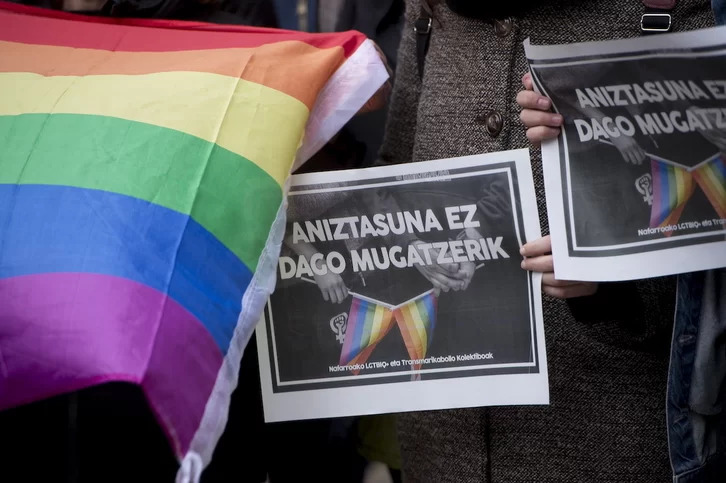"They prevent us from making decisions about our bodies."
- Izei Etxeberria denounces the “bad attention” and “violent treatment” of the Gender Identity Unit of the Cruces Hospital.

Members of the Gehitu trans, non-binary and intersex commission have surveyed eighteen people and have concluded that the “bad” care and treatment of the Gender Identity Unit of the Hospital de Cruces (Barakaldo, Bizkaia) is “violent” and forced to go through psychiatry, among other things. Izei Etxeberria, member of Gehitu’s trans, nonbinary and intersex commission, reports the findings.
Why did you decide to do the survey?
From our personal experience, from people approaching Gehitu and from the records we have seen, we have detected that there are many problems with Osakidetza and especially with the unit. A high percentage of people who came to us talked about ill-treatment and ill-treatment in Osakidetza. That's why we were over a year trying to do something, and recently we were wrong to do this.
What did they want to know through the survey?
First of all, we asked the identity of these people, that is, whether their identity is a trans person binary, nonbinary or other identity. It seems important to us because we have seen that there is much oppression and discrimination against non-binary people in the unit. In many sectors, the existence of nonbinary people doesn't look good and they don't see us as trans people. We also asked what kind of attention they received and how they felt with care, whether they had to go through the psychiatrist or not, and other things.
They report being forced into psychiatry. What does this mean for dissident sex?
The Department of Health notes that the passage through psychiatry is not a process to ensure our identity, but that good attention is paid to the patient to ensure something that is done in any medical process. However, if you go to the psychiatrist, you see that the things you ask are focused on seeing if your vision is binary and cis sexist trans or not.
"Our identities are pathologically, because they want to see that they can enter their standards."
How do you classify it?
They ask you if we played with dolls, cars or with what; what kind of underwear you use; whether we are straight or not, etc. In addition, bisexual, asexual and other people, that is, people who are part of any non-heterosexual sexual sexual sexual sexual affective dissent, are not taken seriously in formulating these questions. In addition, they see that not being heterosexual is a marker that can mean not being trans. To those of us who have said that we are not heterosexual, we have been hampered in continuing the process.
Is it a way of patalizing identity?
Our identities are pathologically, because they want to see that they can enter their standards. In addition, they don't use the concept of trans. Many times they use the transsexual concept, a label that is historically used to patalize our identities. Apart from that, because this psychiatrist doesn't look at people or binaries, we have to lie.
They have also denounced fat attitudes.
The endocrine, when starting the hormonal process and intervening, always makes it difficult for the bodies that read thick within their medical standards. Also, when we ask why they do it, it's not because we have health problems, but aesthetics. They argue that it does not yield good results and that aesthetically it does not remain the same. We're going to decide what aesthetically looks good about our bodies.
"Because this psychiatrist doesn't look at people or binaries, we have to lie."
Do you feel that you have the autonomy to decide?
Of course. This is something that is reproduced throughout the process. As part of dissent, they don't let us get into their standards if we don't make decisions about our bodies. I mean, if you're a nonbinary trans person, if you're not heterosexual, if you're fat, etc. Always, with any physical problem, jeopardize our autonomy over our body, because we are dissident bodies. Every time the doctor, for example, has a physical problem, he asks me if it is related to hormones.
They have called for training for health workers.
There are different realities and there are always new things to learn. That is why we say that we need people with training, but we also need to train people who do not know. They collect different dissident realities and have biases with those they treat, like trans, migrated, racist and obese people. They're not intentional biases, so training can help overcome biases. Feminism has long denounced Machian and Sexist biases.
Young people start consuming pornography before, as porn is their only sex education. How on earth have we come here?
Today, it has to be acknowledged that thanks to the Internet it is much easier to see pornography. Unfortunately, through a click, the 7-9 year-old boy comes to... [+]
Zamora, late 10th century. On the banks of the Douro River and outside the city walls the church of Santiago de los Caballeros was built. The inside capitals of the church depict varied scenes with sexual content: an orgy, a naked woman holding the penis of a man… in the... [+]





















